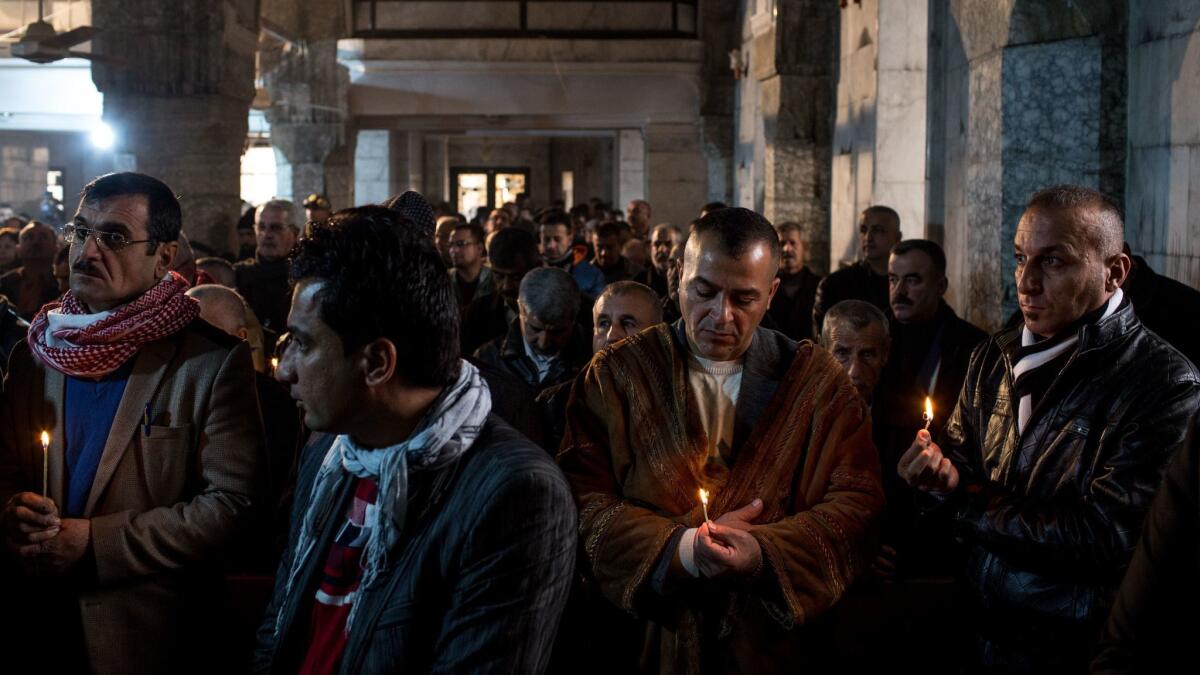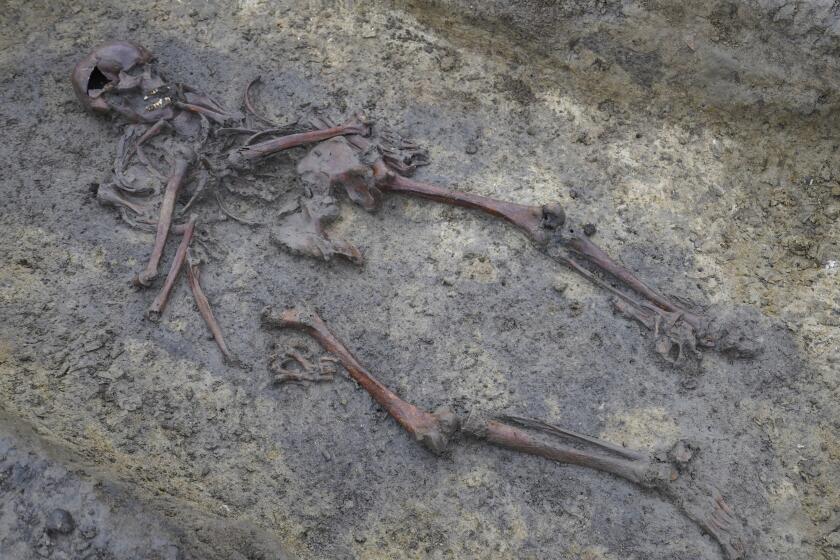With Christmas Eve Mass, Iraqi Assyrians reclaim church from Islamic State

Reporting from Bartella, Iraq — Ten white buses sped west from the northern Iraqi city of Irbil on Saturday morning, packed with displaced Assyrians intent on spending Christmas Eve in their mostly Christian hamlet, recaptured in October from Islamic State.
“I miss my church and my town,” said one of the drivers, Ibrahim Behnam, 50.
When they arrived for an 11 a.m. Mass at the Mar Shimoni church, they found a Christmas tree at the entrance, flanked by armed guards. Snipers perched on the roof.
Two days earlier, suicide bombers had attacked a busy market just a few miles west, killing 23 people. But that didn’t stop several hundred of the faithful from making a pilgrimage home.
“I know all of them,” said Father Yacoub Saad Shamas, noting that the church once served 2,000 families.
The priest darted across the church courtyard in his black cassock, welcoming worshipers as gray skies threatened rain.
I am happy, but with a broken heart.
— Samira Aziz, former resident of Bartella.
An elderly woman kissed his hand. Iraqi military commanders greeted him warmly, as did U.S. Army Lt. Col. Ed Matthaidess III, who brought a dozen members of the 101st Airborne Division. The Americans sat at the back of the sanctuary with an interpreter.
As the church filled, women slipped on lacy black mantillas and filed up into the balcony, past singed walls still spray-painted with warnings of bombs, since removed. Windows and crosses were broken, but the crystal chandelier was unharmed, reflecting the glow of the altar as they prayed in Assyrian and Arabic.
“God protect us and clean us from the inside,” the priest intoned. “You are the almighty God, our God forever.”
It was Samira Aziz’s first visit since Bartella was freed. The 50-year-old maid thought of her mother, who had always wanted to be buried here next to her son, a soldier killed years ago in the Iran-Iraq war. She died last year, after the family fled east to the semiautonomous Kurdish region of Iraq, and had to be buried in Irbil.
“I am happy, but with a broken heart,” said Aziz.

Displaced Assyrians returned to Bartella to celebrate Mass in the mostly Christian town that was recaptured from Islamic State.
Sgt. Maj. Mokhles Salem Yousef, a local police officer, brought his two sons, ages 8 and 5, to see a hometown they barely remember. Before Mass, they stopped by their old house, now empty, their toys destroyed.
The church bells rang and drowned out, for a time, the boom of fighting in nearby Mosul.
Behnam, the bus driver, stepped outside for a break. During the drive in, he was upset to see Shiite Muslim flags hanging from empty homes, installed there by the Iraqi forces who ousted Islamic State from the town.
“We just want the Iraqi flag,” he said.
Behnam feared most of his neighbors would not rebuild. At least 400 homes were destroyed, hundreds more burned and looted, according to the priest. There’s no electricity or running water. Some former residents have already moved abroad.
“I’m not sure I will return,” Behnam said.
He pointed to a statue of a church patriarch, its head knocked off by militants. Beyond that lay the church cemetery, where Islamic State fighters dug into graves and planted a rocket.
Many here fear the fighters could return if Mosul isn’t captured and secured soon. Nearby Gogjali, where the suicide bombers struck this week, was supposed to have been freed Nov. 1.
Behnam said he felt safe with all the soldiers at the church. “But to come back and sleep here as a family? No.”
His family of eight has settled into two trailers at a camp in Irbil that is full of Assyrians who fled Islamic State’s lightning advance across parts of northern and central Iraq two years ago. The camp has expanded to include restaurants, a barbershop and a room where elderly men play cards.
Khaled Ishak Matti, 46, a mechanical engineer whose house was destroyed by the militants, was more defiant.
Assyrians have endured here for 6,000 years, he said, surviving Arab, Mongol and Persian rule. He intends to rebuild and wants the U.S.-led coalition to help protect the town.
“This is our land,” he said. “But life cannot be like before. We need security, safety.”
Neama Aggula, a 42-year-old civil engineer, said militants stole everything from her house, “even the doors.” She has not had a Christmas tree since she fled to Irbil and is holding off getting one until she moves back home.
As Mass ended, Saida Hama, 75, walked quickly out the door and down a nearby alley strewn with pots, pans, fans, heaters and other debris, toward what remained of her small orange house.
Hama wore a large wooden cross and a green scarf that barely shielded her from the rain. At home, she found her disabled son, Mazin Danou, who uses leg braces, sorting through the dusty remains of their household.
“Daesh took what was in good condition,” he said, using an Arabic acronym for Islamic State. They stole the refrigerator, stove, water pump, gas drums.
As the pair stood under an olive tree in the yard, a boom sounded in the distance. “From Mosul,” he said.
Hama hurried off to another church, where she had arranged to meet neighbors to pray.
She passed the ruins of a priest’s house, then the downtown shopping district, showrooms all smashed, including a mini-mart her son once ran. Finally, she reached St. George’s, doors gaping, rubble strewn across the floor, the altar charred black.
It was past 3 p.m. Soon the buses would depart for Irbil. On Sunday, there would be more Masses for other families and Assyrian troops stationed in nearby towns.
Bashir Shamon Sadea, a tribal council leader, said the community needs help fighting “dark forces.”
“Daesh came to kill the soul. But they couldn’t. They killed the body,” Sadea said outside Mar Shimoni. “We are back now.”
Twitter: @mollyhf
ALSO
Predawn services and the pall of the drug war mark Christmas in the Philippines
Trump’s comments on nuclear weapons rattle U.S. officials and foreign leaders
Dozens of migrants braved jungles, seas and bandits to reach the U.S. Then they were sent home
More to Read
Sign up for Essential California
The most important California stories and recommendations in your inbox every morning.
You may occasionally receive promotional content from the Los Angeles Times.











